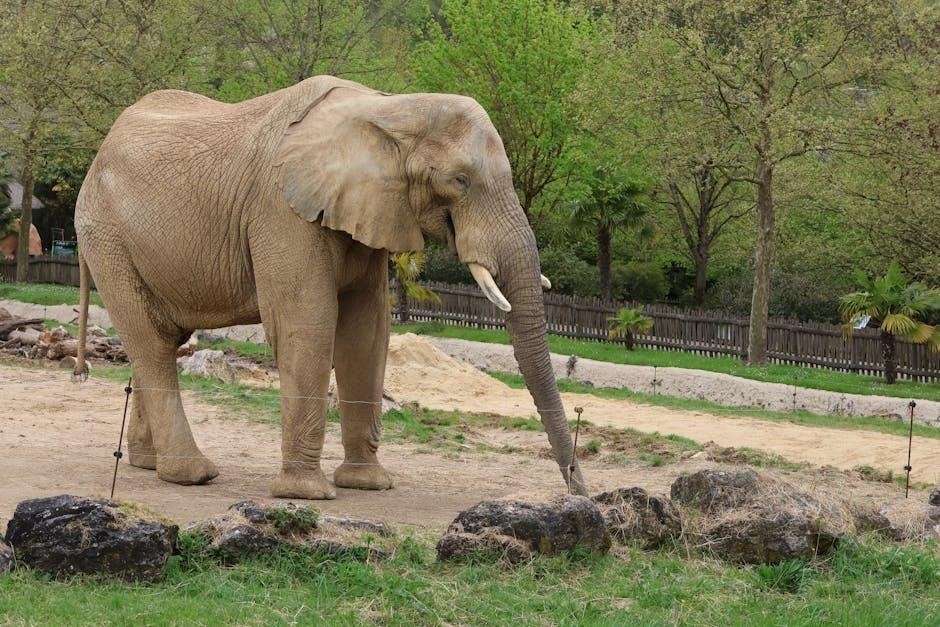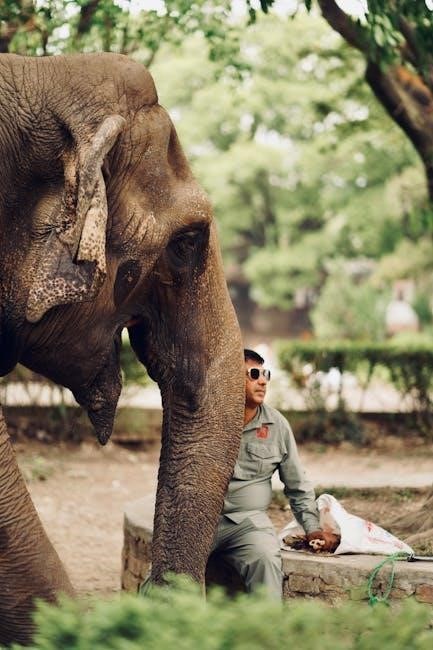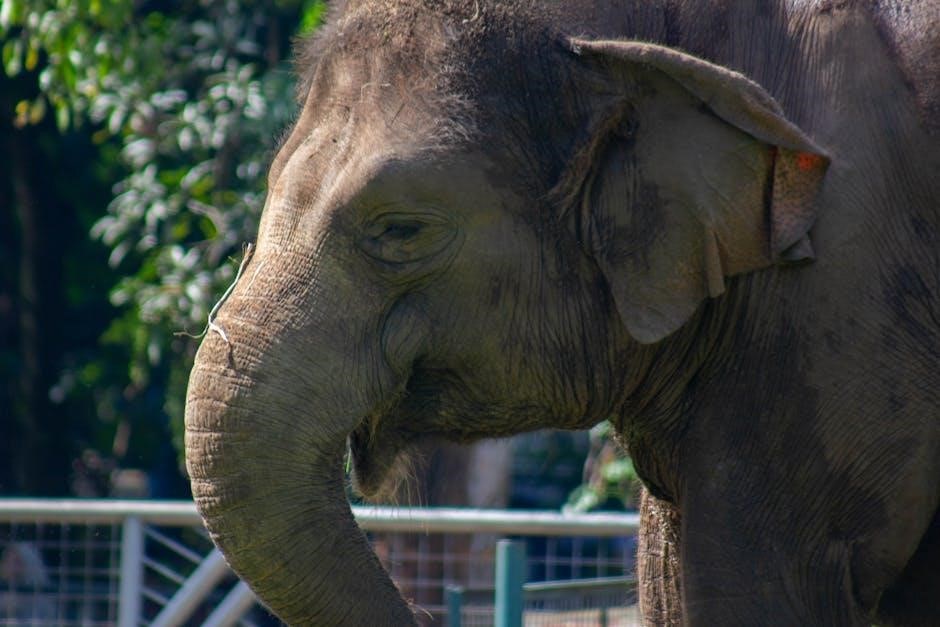George Orwell’s 1936 essay, “Shooting an Elephant,” explores themes of imperialism, moral conflict, and societal pressure through a vivid narrative set in colonial Burma.
1.1 Overview of the Essay
George Orwell’s “Shooting an Elephant” is a thought-provoking essay that recounts a young British officer’s moral dilemma in colonial Burma. The narrator, pressured by societal expectations, grapples with the decision to shoot an elephant that has gone rogue. Through vivid storytelling, Orwell critiques imperialism, exploring themes of power, guilt, and the loss of moral autonomy. The essay offers a poignant reflection on the psychological and ethical complexities of colonial rule, resonating with universal truths about authority and human nature.
1.2 Historical Context of Colonial Burma
Colonial Burma, under British rule in the 1920s, was a land of deep-seated tensions. Orwell, as a young police officer, witnessed firsthand the resentment of the local population towards their colonizers. The British Empire’s presence disrupted traditional Burmese life, leading to economic exploitation and cultural erosion. This oppressive environment shaped Orwell’s experiences and influenced his critique of imperialism in “Shooting an Elephant,” reflecting the broader struggles of colonialism in Southeast Asia during that era.
1.3 Themes and Symbolism in the Essay
Orwell’s essay explores themes of imperialism, moral conflict, and societal pressure. The elephant symbolizes colonial oppression, while the narrator’s internal struggle reflects the moral dilemmas of enforcing imperial rule. The act of shooting the elephant critiques the destructive nature of colonialism and the loss of personal autonomy under oppressive systems. The essay highlights how societal expectations can override individual conscience, leading to morally questionable actions that perpetuate systemic injustice.

Literary Elements in “Shooting an Elephant”
Orwell employs vivid imagery, irony, and a first-person narrative to explore moral complexity, creating a deeply immersive and thought-provoking critique of colonialism and human nature.
2.1 Plot Summary and Structure
The essay recounts a British police officer’s experience in colonial Burma, where he faces a moral dilemma after a rogue elephant wreaks havoc. The narrative begins with the officer being called to manage the situation, leading to his internal conflict about whether to shoot the elephant. Orwell’s structure builds tension, culminating in the officer’s decision to shoot, followed by reflection on the event’s implications. The essay critiques imperialism through this vivid, first-person account.
2.2 Character Analysis: The Narrator and the Elephant

The narrator, a British police officer in colonial Burma, grapples with internal conflict and moral ambiguity. He symbolizes the complexities of imperialism, torn between personal morality and societal expectations. The elephant, though destructive, embodies the oppressed colonial population, highlighting the brutality of imperial authority. The narrator’s decision to shoot the elephant, driven by public pressure, underscores his vulnerability to societal judgment and the futility of colonial power dynamics.
2.3 Themes: Imperialism, Guilt, and Moral Dilemma
Orwell’s essay delves into the themes of imperialism, guilt, and moral dilemma, critiquing colonialism’s oppressive nature. The narrator’s internal conflict reflects the moral complexities of imperial authority, where personal conscience clashes with societal expectations. Guilt permeates the narrative as the narrator confronts the futility of his actions, driven by fear of public judgment rather than necessity. This underscores Orwell’s critique of colonialism’s psychological and ethical corruption, highlighting the loss of moral autonomy under oppressive systems.
2.4 Symbolism: The Elephant as a Representation of Oppression
The elephant in Orwell’s essay symbolizes the oppressed colonized people, embodying their suffering under imperial rule. Its uncontrollable rampage mirrors the chaos of colonialism, while its eventual destruction represents the brutal suppression of resistance. The elephant’s death serves as a metaphor for the senseless violence perpetuated by colonial powers, highlighting the moral decay and hypocrisy inherent in imperialism. Orwell uses this powerful imagery to critique the dehumanizing effects of colonial domination.

Historical Background of British Colonialism in Burma

British colonialism in Burma, spanning the 19th and 20th centuries, imposed harsh rule, exploiting resources and suppressing local culture, shaping Orwell’s critical perspective as a police officer.
3.1 The Role of the British Empire in Burma
The British Empire’s presence in Burma was marked by exploitation and control, with the empire extracting resources while imposing its administrative systems. This period saw the suppression of local customs and the enforcement of British norms, fostering resentment among the Burmese population. Orwell’s essay reflects this tense dynamic, highlighting the empire’s oppressive practices and their impact on both colonizers and the colonized, shaping his critical perspective on imperialism.
3.2 The Impact of Colonialism on Local Populations
Colonialism deeply disrupted traditional Burmese life, as depicted in Orwell’s essay. Local populations faced economic exploitation, cultural erosion, and loss of autonomy under British rule. The imposition of foreign systems led to widespread resentment, with many Burmese feeling powerless against imperial authority. Orwell’s narrative highlights the emotional toll on locals, who lived in constant fear of colonial violence and humiliation, further exacerbating their alienation from their own land and heritage.
3.3 Orwell’s Personal Experiences as a Police Officer
Orwell’s tenure as a police officer in Burma profoundly shaped his views on imperialism. At just 19, he witnessed firsthand the oppressive nature of colonial rule and the moral dilemmas it entailed. His experiences influenced his writing, particularly in “Shooting an Elephant,” where he reflects on the internal conflict between personal morality and societal expectations. These experiences left a lasting impact on his literary work, critiquing the hypocrisy and brutality of colonial systems.
Analysis of the Essay’s Narrative Style
Orwell’s narrative style in “Shooting an Elephant” is deeply personal and reflective, using vivid imagery to convey moral complexity and societal critique through a first-person perspective.
4.1 First-Person Narrative and Its Effectiveness
The essay employs a first-person narrative, immersing readers in the narrator’s internal conflict. This perspective heightens emotional engagement, making the moral dilemma feel personal and immediate. Orwell’s use of direct thought processes allows readers to witness the narrator’s struggle with imperialism and societal expectations, creating a sense of intimacy and authenticity. The narrative voice effectively conveys the psychological tension, drawing readers into the complexities of colonialism and personal accountability.
4.2 Use of Imagery and Descriptive Language
Orwell’s vivid imagery and descriptive language immerse readers in the Burmese setting, evoking strong sensory experiences. The narrator’s detailed observations of the elephant’s actions and the surrounding environment create a stark, realistic atmosphere. Descriptions of the elephant’s “beating his bunch of grass against his knees” and the “wretched prisoners huddling in the yard” emphasize the brutality and oppression of colonial rule, reinforcing the essay’s themes of moral conflict and societal hypocrisy.
4.3 The Role of Irony in the Story
Orwell employs irony to critique colonialism, as the narrator, tasked with maintaining order, ultimately perpetuates senseless violence. The elephant, a symbol of colonial oppression, is killed not out of necessity but to satisfy the crowd’s expectations, highlighting the hypocrisy of imperial authority. This irony underscores the moral corruption and absurdity inherent in colonial systems, where power dynamics distort rational decision-making, revealing how colonialism warped both oppressor and oppressed, leading to actions driven by appearances rather than morality.

The Psychological and Moral Conflict of the Narrator
The narrator grapples with internal conflict, pressured by the crowd to shoot the elephant, highlighting his moral struggle between personal conviction and societal expectations.
5.1 Internal Struggle: To Shoot or Not to Shoot
The narrator faces a profound internal conflict, torn between his moral aversion to killing the elephant and the pressure to act decisively as a colonial authority figure. His hesitation reflects the ethical dilemma of upholding imperial expectations versus sparing the animal’s life. This struggle underscores the psychological burden of conforming to societal norms, even when they contradict personal beliefs. The tension between duty and empathy is palpable, highlighting the complexity of human decision-making under oppressive systems.
5.2 The Influence of Public Opinion on Decision-Making
The narrator’s decision to shoot the elephant is heavily influenced by the presence of the crowd, symbolizing the oppressive weight of public opinion. Fearing ridicule and a loss of authority, he feels compelled to act, even against his moral judgment. This highlights how societal expectations can override personal ethics, leading to actions driven by the desire to maintain a facade of control and power, rather than genuine necessity or compassion.
5.3 Guilt and Remorse After the Event
The narrator feels deep guilt and remorse after shooting the elephant, recognizing the act as a senseless submission to colonial expectations. The elephant’s death symbolizes the destruction of innocence and the moral decay of imperialism. Orwell highlights the narrator’s internal conflict, revealing how the pressure to conform leads to actions that haunt the conscience. This remorse underscores the universality of moral dilemmas, resonating with readers long after the event.
The Significance of the Elephant in the Story
The elephant symbolizes colonial oppression and the destructive nature of imperialism, serving as a powerful metaphor for the consequences of unchecked power and societal expectations.
6.1 The Elephant as a Symbol of Colonial Oppression
The elephant in George Orwell’s “Shooting an Elephant” symbolizes the oppressive nature of colonial rule. Its massive strength and uncontrollable power mirror the fear and dominance associated with imperialism. The narrator’s decision to shoot the elephant, despite its calm demeanor, highlights the senseless violence and exploitation inherent in colonialism. The elephant’s death serves as a metaphor for the destruction of indigenous freedom under oppressive regimes.
6.2 The Elephant’s Role in Highlighting Imperial Hypocrisy
The elephant serves as a powerful symbol to expose the hypocrisy of imperialism. Orwell uses the creature’s destruction to critique the moral contradictions of colonial rule. The narrator, pressured by the crowd, shoots the elephant despite its calmness, illustrating how imperial authorities often justify violence under the guise of order. This act reveals the deep-seated hypocrisy of colonial powers, who claim to bring civilization but perpetuate senseless destruction and oppression.
6.3 The Elephant’s Death as a Metaphor for Colonial Violence
The elephant’s death symbolizes the brutal and often senseless violence inherent in colonialism. Orwell uses the act of shooting the elephant to illustrate the destructive nature of imperial power, where violence is justified under the guise of maintaining order. The elephant’s slow, agonizing death mirrors the devastating impact of colonial rule on indigenous cultures and societies, highlighting the futility and moral decay of such systems.
The Crowd’s Reaction and Its Implications
The crowd’s expectation of violence pressures the narrator, highlighting how public opinion enforces colonial authority and moral compromise, reflecting societal dynamics of power and conformity.
7.1 The Crowd’s Expectation of Violence
The crowd’s anticipation of violence intensifies the narrator’s internal conflict, as their presence creates a pressure to act decisively. Orwell portrays the crowd as a force that demands conformity to colonial norms, expecting the officer to assert authority through violence. This expectation underscores the societal dynamics of power and control, where public opinion often dictates actions, even when they contradict personal morals. The crowd’s role in amplifying tension highlights the broader implications of societal pressure in shaping individual decisions.
7.2 The Crowd’s Role in Shaping the Narrator’s Actions
The crowd’s presence significantly influences the narrator’s decision to shoot the elephant. Their expectations of violence create a psychological pressure, compelling him to act against his will. Orwell illustrates how societal expectations can override personal morality, as the narrator fears appearing weak or cowardly. The crowd’s role highlights the power of collective opinion in shaping individual actions, even when those actions contradict one’s conscience. This dynamic underscores the broader theme of societal pressure and its impact on moral decision-making.
7.3 The Crowd as a Representation of Colonial Society
The crowd in Orwell’s essay symbolizes the collective mindset of colonial society, emphasizing conformity and the expectation of dominance. Their presence enforces the narrator’s role as a symbol of authority, pressuring him to act against his moral judgment. This dynamic reflects how colonialism fosters a culture of oppression, where societal expectations override individual conscience. The crowd’s influence underscores the broader theme of colonialism’s pervasive impact on both the ruled and the rulers.

The Essay’s Relevance in Modern Times
Orwell’s essay remains timeless, offering insights into power dynamics, moral dilemmas, and societal pressures, resonating with contemporary issues of authority and systemic oppression.
8.1 Lessons on Power Dynamics and Authority

Orwell’s essay underscores the dangers of unchecked power and the pressures of conformity. The narrator’s reluctance to shoot the elephant highlights the moral compromises often made to maintain authority. This dynamic remains relevant today, as individuals in positions of power face similar dilemmas. The essay teaches us to question systemic oppression and the ethical use of authority, offering timeless lessons on the responsibility that accompanies power and the importance of standing against societal expectations.
8.2 The Essay’s Commentary on Modern-Day Imperialism
Orwell’s critique of colonialism in “Shooting an Elephant” resonates with contemporary discussions on imperialism. The essay illustrates how power imbalances and exploitation persist in modern forms, such as economic dominance and cultural imposition. By depicting the destruction of the elephant, Orwell symbolizes the devastating impact of imperialistic actions. This timeless critique serves as a warning against repeating historical injustices in today’s globalized world, emphasizing the need for ethical international relations and mutual respect.
8.3 The Universality of Moral Dilemmas in Contemporary Society
Orwell’s exploration of moral dilemmas in “Shooting an Elephant” remains universally relevant today. The essay highlights how individuals face pressure to conform to societal expectations, even when it conflicts with personal ethics. In modern society, similar struggles arise in contexts like systemic injustice, political corruption, and personal accountability. Orwell’s narrative underscores the enduring human conflict between doing what is right and succumbing to external pressures, making it a timeless reflection on ethical decision-making.
Critical Reception and Analysis of the Essay
Scholars widely acclaim “Shooting an Elephant” as a powerful critique of imperialism, with Orwell’s vivid storytelling and moral complexity resonating deeply in literary analysis and discourse.
9.1 Scholarly Interpretations of the Essay
Scholars widely interpret “Shooting an Elephant” as a scathing critique of imperialism, highlighting Orwell’s exploration of moral ambiguity and the psychological toll of colonialism. The essay is praised for its vivid imagery and symbolic depth, with the elephant often seen as a representation of oppressed peoples. Orwell’s personal experiences as a police officer in Burma add authenticity, making the narrative a powerful commentary on the complexities of authority and conscience. Its enduring relevance in literary studies underscores its universal themes.
9.2 Comparisons with Orwell’s Other Works
Orwell’s “Shooting an Elephant” shares thematic parallels with his other works, such as Animal Farm and 1984, in its critique of authoritarianism and exploration of moral complexity. While “Animal Farm” uses allegory, “Shooting an Elephant” employs a first-person narrative to expose the hypocrisy of imperialism. Both works highlight the dangers of unchecked power and the erosion of individual freedom. Orwell’s personal experiences in Burma also resonate with his broader anti-imperialist stance, making this essay a cornerstone of his literary legacy.
9.3 The Essay’s Place in Literary Canon
“Shooting an Elephant” holds a significant place in literary canon, celebrated for its profound critique of imperialism and moral complexity. Widely studied in academic curricula, it is often anthologized alongside Orwell’s other works, such as Animal Farm and 1984. The essay’s vivid narrative and universal themes have cemented its influence, making it a cornerstone of 20th-century literature. Its exploration of power dynamics and human conscience continues to resonate, ensuring its enduring relevance in modern literary discourse.

Educational and Cultural Impact of “Shooting an Elephant”

“Shooting an Elephant” is widely studied in educational curricula, fostering critical thinking on imperialism and morality. Its cultural impact lies in its timeless critique of power dynamics and societal expectations, resonating across generations and inspiring discussions on ethics and authority.
10.1 Use in Educational Curricula
“Shooting an Elephant” is widely incorporated into educational curricula worldwide, particularly in literature and history classes. Its exploration of imperialism, morality, and societal pressure makes it a valuable tool for teaching critical thinking and ethical reasoning. The essay’s concise yet profound narrative allows students to analyze complex themes through a personal and historical lens, fostering deeper understanding of colonialism’s impact and its relevance to contemporary issues.
10.2 Cultural References to the Essay
“Shooting an Elephant” has become a cultural touchstone, frequently referenced in media, literature, and public discourse. Its themes of moral dilemma and societal pressure resonate across various contexts, from political commentary to philosophical debates. The essay’s imagery, particularly the elephant as a symbol of oppression, is often invoked to critique power dynamics and systemic injustice, ensuring its relevance in modern cultural narratives and intellectual discussions.
10.3 The Essay’s Influence on Anti-Colonial Movements
Orwell’s “Shooting an Elephant” significantly influenced anti-colonial movements by exposing the brutality and hypocrisy of imperialism. Its vivid depiction of colonial oppression resonated with activists worldwide, inspiring resistance against foreign rule. The essay’s critique of power imbalances and moral corruption empowered marginalized voices, making it a cornerstone of anti-colonial literature and a powerful tool for challenging oppressive regimes and advocating for self-determination and human rights.
Conclusion
“Shooting an Elephant” masterfully explores imperialism’s moral complexities, revealing the psychological toll of colonialism. Orwell’s narrative remains a powerful critique of oppressive systems and human conscience.
11.1 Summary of Key Points
Orwell’s essay explores imperialism’s moral complexities, highlighting the narrator’s internal conflict and societal pressures. Set in colonial Burma, it critiques oppressive systems through the symbolic shooting of an elephant, representing colonial violence and hypocrisy. The narrative underscores the psychological toll on individuals and the broader implications of imperial authority, offering timeless reflections on power, guilt, and human conscience.
11.2 Final Thoughts on the Essay’s Significance
Orwell’s “Shooting an Elephant” remains a powerful critique of imperialism, offering profound insights into moral dilemmas and societal pressures. Its exploration of human conscience and the psychological impact of authority continues to resonate, making it a timeless commentary on power dynamics. The essay’s universality ensures its relevance in understanding historical and contemporary issues of oppression, authority, and individual responsibility.


